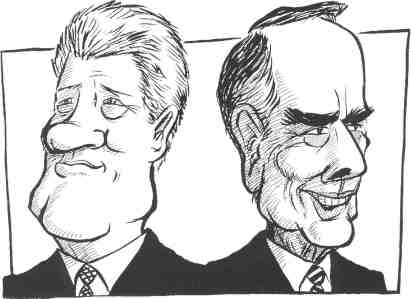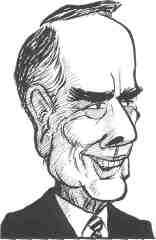CLINTON VS. DOLE
WHAT THE CANDIDATES WILL AND WON'T SAY ON THE CAMPAIGN TRAIL
Story by Bill Lambrecht
24 ¦ August 1996 Illinois Issues We've had an Age of Reason and later an Age of Unreason, what commentator Edward R. Murrow called the McCarthy Era. We endured the frigid Age of Containment, which wasn't nearly as fun as the Age of Aquarius. Then there was the Era of Greed, which was no fun at all for those of us on the outside looking in. Just in time for Campaign '96, a new era has dawned: the Age of Anxiety. In most elections, people look at the economy to decide how well they're surviving, whether they're feeling squeezed. Then they vote their pocketbooks. The dynamic this political season is different. We're used to hearing about the country chugging on the wrong track, careening toward an insecure future. Voters this season are looking not just at today or next month. They're fearful about next year and years ahead and the horrifying specter of having their incomes stripped away without notice. They're fretting about college loans for their children and taking care of their parents. Scared of losing medical care, of outliving their retirement incomes. Their fears may be out of sync with the reality of the U.S. economy. Nearly 10 million jobs have been created in four years. Election Day could coincide with a record high in the stock market — or low in unemployment. Yet people are gripped with anxiety. Ask John Shep Jeffreys, a psychologist in Maryland, one of the professionals who help people cope with workplace changes as common as new job titles or as wrenching as plant closings. "Many people are dealing with the same issue — things are just not what they were. They feel overwhelmed," he says. All the polls show it. William McInturff, who until February was pollster for Republican presidential nominee Bob Dole, was stunned by his findings. In 1988, 38 percent of people in his poll worried about saving for retirement. This year, that number is about 60 percent, a shift he describes as extraordinary. Moreover, McInturff believes Republicans have done a poor job of dealing with people's insecurities — which is likely a factor both in Dole's campaign problems and in McInturff's departure from the candidate's cadre of top advisers. "There has not been a lack of GOP accomplishments but rather a failure of communications," McInturff says. The shift in voter sentiments has a lot to do with people's relationships to their employers, which are considerably more tenuous than in November of 1992. While new jobs may indeed exist — and many of them beyond hamburger-flipping — a new workplace ruthlessness generates insecurity. Geoffrey Garin, a pollster who advises the White House and many Democratic clients, frames the change as nothing short of a shift in societal order. "Under the old rules, if you worked hard, did a good job and were loyal to your employer, you would be rewarded by loyalty in return. You would share in the good fortune of your company as a matter of fairness, not as a result of economic necessity," Garin says. Illinois pollster Mike McKeon defines the mood as realism. People understand changes, McKeon asserts, and what they want from leaders is help in coping with the new hunter-gatherer economy. "When people take a job now, they know they're not going to have it forever. The whole fiber of Americanism is let's move on to the next stage," he says. Political playbooks reflect the times. For Clinton and the Democrats, the issues are families, education, economic security, crime and drugs and the environment. Throw in world leadership as an afterthought. Talk a lot about Medicare, Medicaid and Social Security. And perhaps abortion, depending on how poorly Republicans resolve their ongoing fight between the ardent antis in the party's base and the abortion-rights wing. If you're Republican, the key issues are taxes and spending, crime and drugs, and welfare reform. Bob Dole will be talking plenty about what he sees as America's decline in the world, as when, in a recent speech in Louisville, he borrowed one of conservative commentator Pat Buchanan's most dependable applause lines. "When I'm president, no American soldier will be forced to serve under Boutros Boutros-Ghali. They will serve under the Stars-and-Stripes, not the pale blue flag of the United Nations," Dole said. Most of all, Republicans want this election to be about character. They will labor to shift the campaign away from pocketbook issues into the domain of values. They're hoping the story of the Hero from Russell honed at the Republican convention in San Diego outsells the saga of the Man from Hope, which propelled Bill Clinton from the Democratic convention at Madison Square Garden in 1992. If you're an independent or a Reform Party member, you may see international trade agreements, conspired to by the major parties, as the culprit of our insecurity. But don't expect either of the major
Illinois Issues August 1996 ¦ 25
parties to inveigh against corporate greed or propose tax penalties for corporations that refuse security and benefits to their workers. Nor, for that matter, will either of the White House candidates dwell on campaign spending limits, public finance or any of the reforms that might erode the advantage of incumbents. And health care? The issue that dominated public policy debates three years ago and lost the Democratic Party its half-century lock on the House? Four years ago, the Democratic platform declared "universal access to quality, affordable" health care a right. In this year's version, which decries Big Government solutions, only limited reform is offered. As always, this presidential election may have more to do with goof-ups and slogans than what journalists and academics call substantive issues. The stakes in this election — family security, tax policy, environmental controls and the shape of the federal regulatory structure — may be overshadowed by scandals du jour. The Kafkaesque gathering of FBI files in the early hours of Bill Clinton's watch could dwarf any tactical political advantage the maneuver might have gained. It might not, too. And who knows? It may turn out that Dole's insistence that cigarettes aren't addictive will cause more enduring damage than Gerald Ford's bumbling assertion 20 years ago that Poland was a free state rather than chained to the Soviet bloc. Butt Man, the Democrats' slick cartoon-villain, may be one tough adversary for Bob Dole. As Election Day nears, prepare for the next generation of attack ads rather than bright lights on the road to the next century. When you tune in the Major League Baseball playoffs, expect to see mug shots shuffled on the screen like Whitewater trading cards, accompanied by the sound of slamming cell doors. Or gay-pride footage highlighting the newest family-values bugaboo: same sex marriages.
From the Democratic media purveyors, you'll hear the words extremist, rollback and slice ad nauseam. Expect, too, to see the television-morphed evolution of a creature called Dolegingrich. And you know we'll be reminded that Dole is 73 and going on 100. Who really knows what moves voters this way or that? Or, for that matter, what makes an issue an issue that lasts? We can't do much more than sniff the air, listen to the candidates and sound out the people Harry S. Truman called "the smart boys" — the consultants and strategists of the professional political ranks. What we can say for sure about the American political system is that no longer are we operating in the Age of Innocence. So how do the issues cut?
Future: As an incumbent, Clinton is well-positioned to capitalize on voters' uneasiness by offering them such tonics as generous tax breaks for college. To Dole's advantage is voters' tendency to trust the Republican
26 ¦ August 1996 Illinois Issues
Party to guide the economy. But Democrats have Medicare, the new third-rail of American politics. The sense last year that Republicans were trying to cut Medicare by $270 billion — rather than stem growth in the program — brought the Democratic Party back from the abyss. Advantage: Democrat. Values and character: Is it the culture, stupid? Dole sounds like a school principal lecturing about the excesses of Hollywood. But it works. The story of his wounding in Italy and his agonizing recovery is classic. What's more, there's always the chance that disclosures about Clinton will reach critical mass. Advantage: Republican. Crime: Remember Clinton's 100,000 cops on the street? White House advisers never expected to do more than neutralize the quadrennial Republican advantage on this issue. Dole's decision this summer to back away from his promise to repeal the assault weapons ban suggests that Democrats may be doing better than a tie. Nonetheless, the historical Republican advantage is too great to overcome. No advantage. Environment: Clinton showed his hand on the Fourth of July, blending patriotism with environment when he released an American bald eagle. Never mind that the eagle was knocked in the drink by a couple of aggressive osprey. Once a single-digit blip on the radar screen of public opinion, the environment has skyrocketed to prominence thanks to a Republican policy offensive that went awry. Republicans in Congress, goaded by industry, thought they could extend deregulation to clean air and water. They learned that voters have come to view safe and healthful surroundings as their inalienable right. Advantage: Democrat. Taxes and spending: The Steve Forbes surge was not that long ago. His pollsters found an enormous reservoir of discontent over the tax code, not just at high taxes but also over the complications and arrogance in the system. Dole won't be dragged into the supply-side wing of his party, but he will go far enough to promise a massive tax cut and less draconian collection. Advantage: Republican. Political reform: You don't have to be a Perotista to understand arrogance. Despite the overwhelming will of voters, the political establishment in Washington will have spent another four years refusing to decouple money and politics. In fact, it's getting worse, judging by the tobacco and gambling money pouring in and the PAC monies accepted by would-be reformers of the freshman class. Expect the decomposition of the two-party system to continue. Advantage: Reform Party Sleeper issue: Same-sex marriage. Besides energizing the Christian Right, this issue has what it takes to create the next Willie Horton campaign ads. Clinton will be forced to sign legislation denying gay couples federal benefits. The president tripped badly on the related issue of gays in the military in his first weeks in office. Congressional Democrats are vulnerable, too, if they stand up for civil rights. Advantage: Republican. Bill Lambrecht is national political writer in Washington for the St. Louis Post-Dispatch. A longtime Illinoisan, he wrote about energy policy for Illinois Issues' premier edition in January 1975. His articles on utility regulation in 1981 won the magazine's first national award — given by The Washington Monthly.
SIMON AND PEROT TEAM UP IN BOOK PRESCRIBING STERN FISCAL MEDICINE
Don't expect to be entertained if you pick up Paul Simon's latest book. Illinois' senior senator and co-author Ross Perot have a much grander ambition. The goal of their book, they say, is "to change the world." Titled The Dollar Crisis: A Blueprint To Help Rebuild the American Dream, the 148-page paperback attempts to first explain the economic sins of the federal government and then rally citizen support for the nation's fiscal redemption. Beginning "not too many centuries ago" with the barter system of exchange, Simon and Perot attempt to offer a plain-language explanation of how the U.S. government became buried in debt and how it can tunnel out. The prescription — summarized by a quotation from Cicero — is not pretty: "The budget should be balanced. The treasury should be refilled. Public debt should be reduced. The arrogance of public officials should be controlled." The austerity message is underscored by one section subtitled: "No pain, no gain." The authors urge passage of a balanced budget amendment to the Constitution, reduction in the U.S. trade deficit, encouragement of savings and a long-term focus on problems that retard economic growth: education, lack of funding for research and poverty. But Simon and Perot are not interested in changing the world by themselves. In what they call "A Conclusion That Needs You," they give readers homework to do and urge them to carry on the crusade by writing members of Congress and newspaper editors, and telling friends that "we ought to do something." The collaboration began when a Senate report on monetary policy prepared by Simon, long an opponent of deficit spending, caught Perot's attention last year. Simon accepted Perot's invitation to address the issue before a gathering of the United We Stand America organization in August 1995, and the idea for a book grew out of that appearance. Simon, who has written 15 other books, typed out rough drafts that Perot critiqued with suggestions. Perot, whose colorful charts probably won the graphic artists' vote in 1992, also shows his influence in the many pie charts and line graphs that illustrate the book. If you want to learn about The Dollar Crisis, it will cost you eight of them at your favorite bookstore. -Donald Sevener Illinois Issues August 1996 ¦ 27 |
||||||||||||||||




